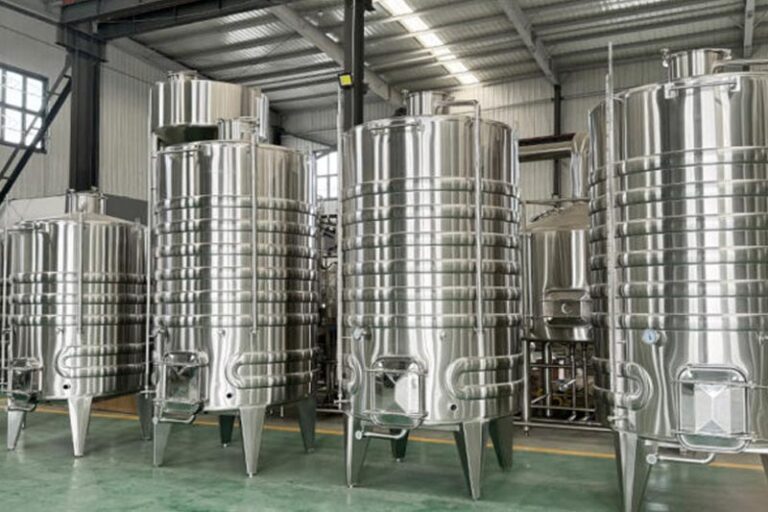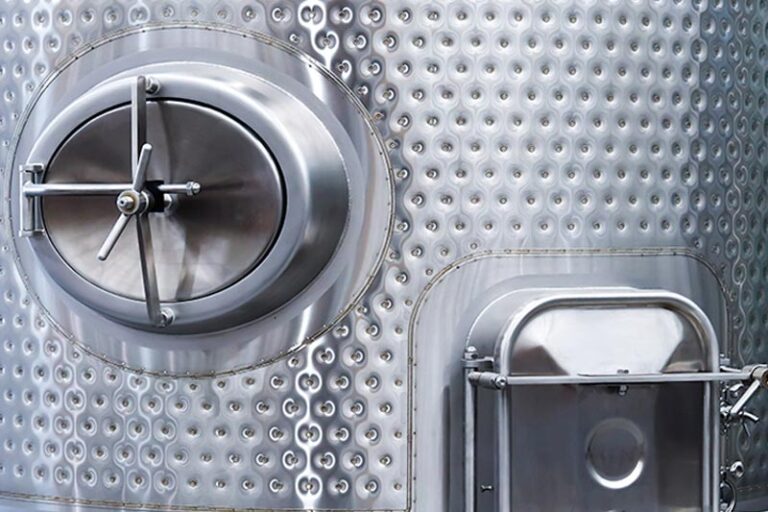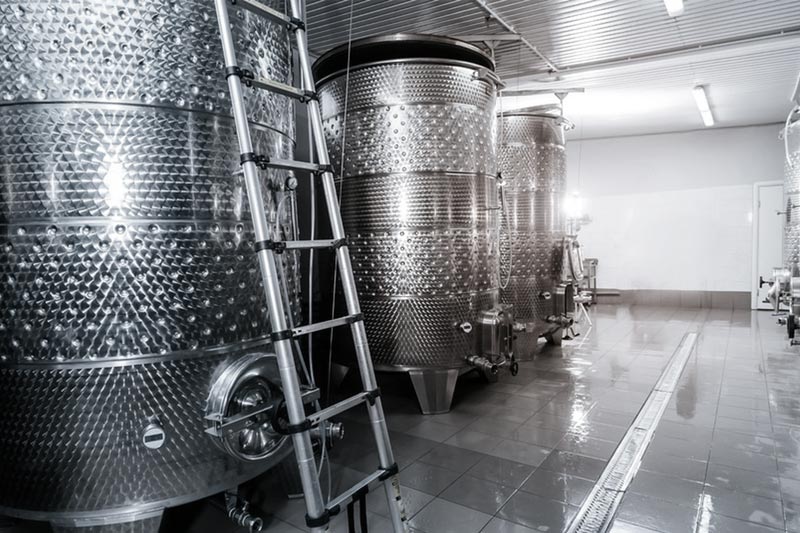The fruit wine fermentation tank is an important equipment in the fruit wine brewing process. Its design and function directly affect the quality and flavor of the fruit wine. Traditional fermentation methods often rely on natural fermentation, which is complicated and easily affected by the external environment. Modern fermentation tanks can better control the fermentation process and improve the flavor stability and consistency of fruit wine through precise temperature control, pressure control, and oxygen management.
What is a fruit wine fermentation tank?
A fruit wine fermentation tank is a device used to ferment juice into an alcoholic beverage. It usually has a temperature control and airtight design to optimize yeast activity. The material is generally stainless steel or food-grade plastic to ensure hygiene and durability. During the fermentation process, the sugar in the juice is converted into alcohol and carbon dioxide, forming a unique fruit wine flavor.
Features of fruit wine fermentation equipment:
- Material safety: The equipment is generally made of stainless steel or food-grade materials to ensure hygiene and fruit wine quality during the fermentation process.
- Stirring function: Some equipment is equipped with an automatic stirring system to evenly mix the juice and yeast to improve fermentation efficiency.
- Exhaust device: Carbon dioxide is produced during the fermentation process, and the equipment is usually equipped with an effective exhaust device to prevent excessive pressure.
- Easy to clean: The equipment is designed for easy cleaning and reduces the risk of cross-contamination.

Types of fruit wine fermentation tanks
The winemaking process cannot be separated from the right fermentation tank. Different types of fermentation tanks will affect the flavor, quality, and production efficiency of the fruit wine.
- Stainless steel fermentation tank: The tank is corrosion-resistant, easy to clean and maintain, has good sealing performance, and can effectively prevent oxidation and pollution. Stainless steel tanks are suitable for large-scale production and are the most common choice in modern fruit wine brewing.
- Glass fermentation tank: Often used for small batch production, especially in home brewing or laboratory environments. This tank is transparent, and the fermentation process can be clearly observed, which is convenient for control and adjustment.
- Plastic fermentation tank: It is not as durable and temperature-controlled as stainless steel and glass, but the tank is light and cheaper, which is suitable for beginners and small-scale winemakers.
- Barrel fermentation tank: Barrels can not only provide unique flavors but also promote the maturation and development of fruit wine. Due to the microporous properties of wood, a certain degree of oxygen permeation can be allowed, adding complexity to winemaking.
Structure of stainless steel fruit wine fermentation tank
- Tank: The main body of the fermentation tank is usually made of high-quality stainless steel, which is corrosion-resistant, easy to clean, and does not affect the taste of the wine. Stainless steel has good thermal conductivity, which helps to keep the fermentation temperature stable.
- Stirring system: Many fermentation tanks are equipped with a stirring system, which can effectively mix the juice with yeast and promote the fermentation process. The stirring method can be mechanical stirring or gas stirring (such as introducing air or carbon dioxide).
- Temperature control system: Temperature control during fermentation is crucial. Some high-end fermentation tanks are equipped with temperature control systems, including temperature sensors and heating/cooling devices to ensure that fermentation is carried out within the optimal fermentation temperature range.
- Exhaust device: Carbon dioxide will be produced during the fermentation process, so an exhaust device needs to be set up to discharge excess gas in time while keeping the pressure in the tank stable.
- Discharge port: There is usually a discharge port at the bottom of the tank for convenient discharge of finished fruit wine after fermentation is completed. The design of the discharge port must ensure that no residue is left to avoid affecting the subsequent fermentation and cleaning process.
- Observation window: Some fermentation tanks are equipped with observation windows to facilitate production personnel to observe the fermentation status and promptly judge whether the fermentation is normal.
- Support and foundation: The fermentation tank is usually installed on a solid support to withstand the weight and pressure of the liquid inside. At the same time, there needs to be a good seal between the tank and the ground to prevent leakage and contamination.

The process of fruit wine fermentation
- Crushing: Crush the fruit into small pieces to better release the juice.
- Juicing: Use a juicer or press to squeeze the crushed fruit to get the juice.
- Fermentation: Pour the adjusted juice into the fermentation container, add an appropriate amount of yeast, and ferment. During the fermentation process, it is necessary to control the temperature, humidity, ventilation, and other conditions to ensure the normal growth and fermentation of the yeast.
- Aging: After the fermentation is completed, the fruit wine is transferred to the aging container for aging. During the aging process, the taste and flavor of the fruit wine will gradually become more mellow and complex.
- Clarification: There may be some sediment in the fruit wine, which needs to be clarified. Filtration, centrifugation, and other methods can be used to remove the sediment.
- Sterilization: To ensure the quality and safety of the fruit wine, the fruit wine needs to be sterilized. High-temperature sterilization, ultraviolet sterilization, and other methods can be used.
- Filling: Fill the sterilized fruit wine into bottles or other containers and seal them for storage.
Factors affecting the price of fruit wine fermentation tanks
- Material: Stainless steel jars are generally more expensive than plastic and glass jars. High-quality stainless steel fermentation tanks typically cost between $500 and $5,000 due to their durability and safety.
- Function: Some fermentation tanks are equipped with automatic functions such as temperature control and stirring, which will significantly increase the price. For example, a fermenter with a temperature control system may cost more than $1,000.
- Brand: Fermentation tanks of well-known brands usually have guaranteed quality and after-sales service, and their prices are relatively high. Generally speaking, domestic brands are relatively cheap, while international brands are more expensive.
- Market supply and demand: As the number of winemaking enthusiasts increases, the market demand for fruit wine fermentation tanks increases, which may lead to price fluctuations.
Application scenarios of fruit wine fermentation tanks
Home brewing
In-home brewing, and fruit wine fermentation tanks are usually small and easy-to-operate equipment. Winemaking enthusiasts can use these tanks to produce small batches of fruit wine, such as apple wine, wine, or cherry wine. Home fermentation tanks usually have functions such as temperature control, sealing, and observation windows, which are convenient for users to monitor the fermentation process and ensure the quality of fruit wine.
Small and medium-sized wineries
For small and medium-sized wineries, the application of fruit wine fermentation tanks is more specialized. These wineries usually use fermentation tanks with moderate capacity to facilitate batch production. At this stage, it is crucial to control the fermentation temperature and time. The design of the fermentation tank often includes a temperature control system and agitation device to improve the fermentation efficiency and the stability of the wine quality.
Large-scale industrial production
In large-scale fruit wine production enterprises, the scale and technical requirements of fermentation tanks are higher. These enterprises usually use stainless steel or glass-lined fermentation tanks to ensure better hygiene and corrosion resistance. At the same time, advanced automated control systems can monitor various parameters in the fermentation process, such as temperature, pressure, and pH, to achieve precise control. Large-scale fermentation facilities can meet market demand and ensure production efficiency.
R&D and laboratories
Fruit wine fermentation tanks also play an important role in R&D and laboratories. Many scientific research institutions and universities use small fermentation tanks to conduct new recipes and process research on fruit wine to explore the effects of different yeasts, sugars, and acidity on the flavor of fruit wine. This experimental application helps winemakers continuously improve their products and launch new fruit wines that are more competitive in the market.
Education and training
Fruit wine fermentation tanks are also widely used in education and training. Many vocational schools and training institutions offer fruit wine brewing courses, where trainees can use fermentation tanks to learn the basic principles and techniques of winemaking in practice. This practical experience lays a solid foundation for future winemakers.

FAQ
- Capacity: Choose the right capacity according to the scale of production.
- Material: High-quality stainless steel 304 or 316, which can resist corrosion and high temperatures.
- Structure: Choose a design that is easy to clean and maintain.
- Sealing: Good sealing performance helps control the fermentation environment.

